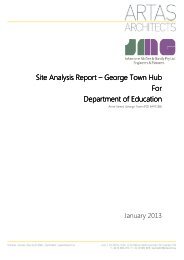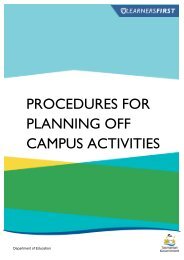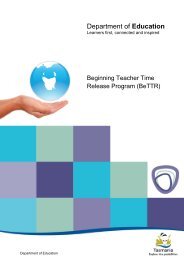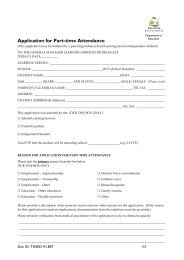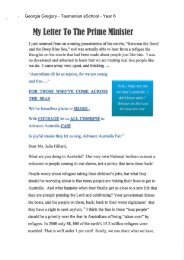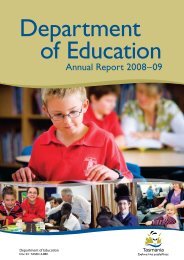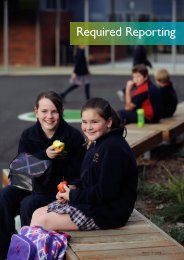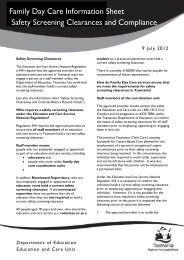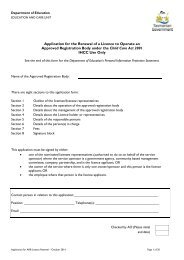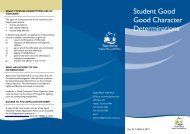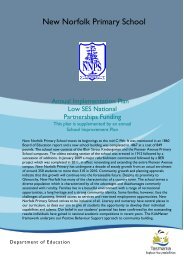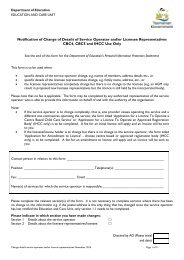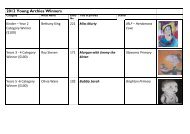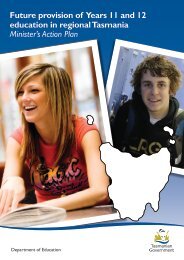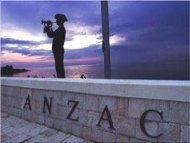Education
DoE Annual Report 2012-2013 - Department of Education
DoE Annual Report 2012-2013 - Department of Education
- No tags were found...
Create successful ePaper yourself
Turn your PDF publications into a flip-book with our unique Google optimized e-Paper software.
Literacy and Numeracy<br />
Direction<br />
Our Learners First Strategy is the foundational source<br />
of direction for improvement in literacy and numeracy<br />
performance, which continues to be one of the<br />
department’s highest priorities.<br />
In particular, the ‘School <strong>Education</strong>: Great Schools… Great<br />
Communities’ section of the plan details the priorities for<br />
improving the literacy and numeracy performance of<br />
all Tasmanians. In 2012–13, the department has further<br />
implemented comprehensive reforms to address<br />
these priorities, with a strong emphasis on literacy and<br />
numeracy achievement in the early years, schools, further<br />
education and training, and in adult learning.<br />
Tasmanian Government schools are currently<br />
implementing the Australian Curriculum from Prep to<br />
Year 10. In 2013, all students in these year levels are<br />
being assessed against the Australian Curriculum in English,<br />
Mathematics, Science and History. Assessment in all other<br />
learning areas remains under the Tasmanian Curriculum<br />
Framework. Australian Curriculum: Geography is planned<br />
for implementation in 2014. All other areas will be<br />
progressively implemented from 2015 onwards.<br />
Literacy and Numeracy are General Capabilities under<br />
the Australian Curriculum and are expected to be taught<br />
across all curriculum areas. However, English and<br />
Mathematics remain key areas of study for teaching and<br />
learning in literacy and numeracy. The knowledge, skills,<br />
understandings and capacities that children develop are<br />
central to learning and necessary for success in all areas of<br />
the curriculum.<br />
The early years are a critical time for all learning and<br />
laying down the foundations for success in literacy and<br />
numeracy. Belonging, Being and Becoming: The Early Years<br />
Learning Framework for Australia guides teachers working<br />
with children from birth to five years and is used in<br />
Tasmania to support all early years programs including<br />
Launching into Learning programs, child and family centres<br />
and Kindergartens. The framework and supporting<br />
resources highlight many important practices to support<br />
children in becoming effective and confident learners,<br />
communicators and thinkers: noting the importance<br />
of adult interaction and conversation with children.<br />
A play-based approach to learning is advocated as best<br />
practice for young children to build literacy and numeracy<br />
capability and make sense of their world through<br />
interactions with people, objects and representations.<br />
The Raising the Bar (RTB) initiative supports Tasmania’s<br />
literacy and numeracy improvement strategy and aims<br />
to increase the number of children finishing primary<br />
school with functional literacy and numeracy skills.<br />
Full implementation of RTB was achieved with the<br />
extension of the program into selected secondary<br />
schools from 2011–12.<br />
The implementation of the Tasmanian Literacy and<br />
Numeracy Framework 2012–2015 explicitly sets out the<br />
priorities, intentions, and approaches to teaching and<br />
learning as well as progress measures, reflecting a statewide<br />
approach to improving learning outcomes for all students.<br />
Schools have an explicit literacy and numeracy strategy as<br />
part of their school improvement plan so that every child’s<br />
literacy and numeracy learning needs can be supported.<br />
Major Initiatives<br />
The department’s direction and literacy and numeracy goals are supported by a range of targeted initiatives.<br />
The progress and influence of these initiatives are generally reflected in literacy and numeracy performance over time –<br />
see ‘Performance’ (next section).<br />
Early Years<br />
In the early years, literacy and numeracy experiences in<br />
the Launching into Learning (LiL) initiative are guided by<br />
Belonging, Being and Becoming – The Early Years Learning<br />
Framework for Australia (EYLF). Literacy and numeracy<br />
capabilities are important aspects of EYLF outcome<br />
number five: ‘Children are effective Communicators’.<br />
The importance of early literacy and numeracy<br />
experiences were highlighted by the inclusion of the early<br />
years in ‘Snapshots of the Practices and Strategies in<br />
Action’ section in the department’s publication Supporting<br />
Literacy and Numeracy Success – A teacher’s resource for<br />
Early Years to Year 12.<br />
The involvement of parents in the early years is critical<br />
for children to be effective communicators and positive<br />
partnerships between schools and parents help to build a<br />
strong foundation for future learning.<br />
The latest results from the longitudinal analysis of LiL<br />
demonstrate the continued effectiveness in boosting<br />
educational outcomes for participating students, and<br />
particularly those from lower socioeconomic backgrounds.<br />
30 Pre-Compulsory and Compulsory <strong>Education</strong> » Literacy and Numeracy



